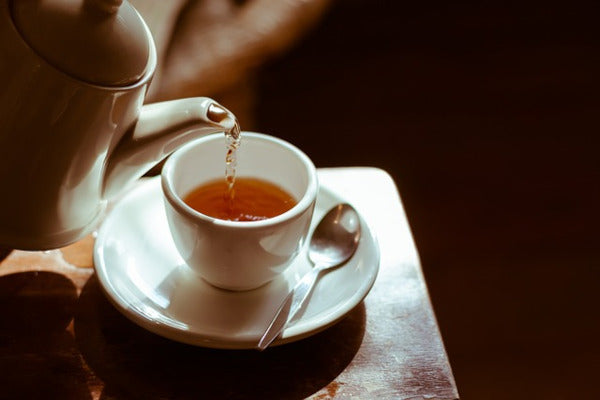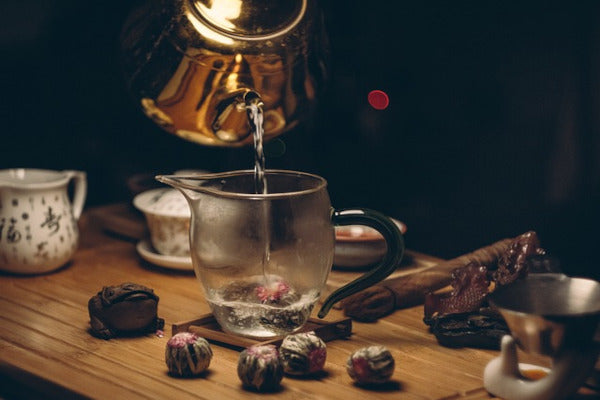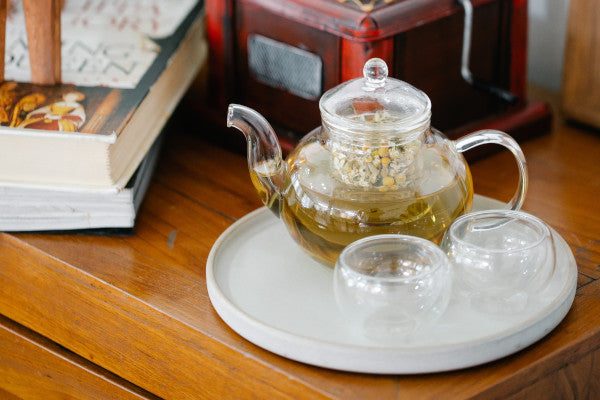Ginger (Zingiber officinale) is a plant from the Zingiberaceae family and a monocotyledonous plant. It is a tropical perennial native to Asia. It produces clusters of buds that open to produce yellow, green, and purple flowers. Its aromatic underground rhizome is used as a culinary spice worldwide, for example, to prepare an organic infusion .
History of ginger
Ginger has been cultivated for millennia in China, India, Southeast Asia, West Africa, and the Caribbean, before reaching the West 2,000 years ago. It is mentioned in ancient Sanskrit and Chinese writings and in ancient Greek, Roman, and Arabic medical literature.
Its roots owe their popularity to both their medicinal properties and their nutritional uses. Ginger's culinary uses are wide-ranging, as it's used fresh in Asian dishes, in vinegar or sherry as an aperitif, and candied in desserts.

There are also ginger liqueurs, green ginger wine, and the traditional ginger beer. Among its various forms of consumption are dried, crushed, or fresh roots, liquid extracts, syrups, infusions, tinctures, tablets, and capsules, some of which already have a standardized gingerol content.
Not without reason, it's an important component in Ayurvedic medicine and traditional Chinese medicine (TCM). The essential oils, vitamins, and minerals in the root are also responsible for its energy efficiency.
Ginger, or Kion, is best known as a spice in cooking and very popular in the form of organic ginger tea , also known as ginger water. Depending on the recipe, ginger can be mixed with lemongrass , licorice, and other herbs to refine its flavor. Ginger is often prepared with green or black tea .
Organic ginger tea is also a good option and offers many benefits, as it has a wide variety of purifying effects on the body. Ginger tea helps with nausea and indigestion , and often works wonders. For people who like to eat a lot, ginger tea helps make digestion more bearable after a heavy meal. You can drink it hot or cold .
Benefits of Ginger Tea or Infusion
Cold: During cold weather or if you've caught a cold, there's nothing better than drinking a warm cup of organic ginger tea . Some people like to drink it before eating, but after a heavy meal, ginger stimulates digestive juices. Ginger tea can even help you lose weight , as it boosts your metabolism.

Antibiotic and Immune Stimulant: The pungent substances in ginger, gingerol and shoagol, closely resemble aspirin in chemical structure, and are therefore said to have similar effects to a painkiller. Ginger has antibiotic and immune stimulant properties and is a good tonic .
Digestion and detoxification: The digestion of fats in the intestine is enhanced by ginger, as ginger generally stimulates the production of gastric acid , so that other foods can also be digested more quickly and easily.
Ginger has antioxidant properties and therefore supports the digestive system, detoxifies the body and rejuvenates.
Ginger is said to have additional support for bronchitis, liver problems, aches and pains, sore throat, rheumatic conditions, motion sickness, and diarrhea.
Ginger often helps even with fatigue, exhaustion, tiredness, and lack of energy, while stabilizing mentally and physically, stimulating, and strengthening.
Kion Ginger Tea Precautions
There are few side effects when ginger is taken in small doses. However, gas, bloating, heartburn, and nausea are sometimes associated with powdered ginger.

Allergies often appear as a rash. People with gallbladder disease should avoid this plant.
Use caution when combining ginger herbal medicine with other herbs, medications, or blood-thinning drugs.
Pregnant women and children under 6 years of age are not recommended to take ginger.
Ginger should not be taken before a planned surgical procedure, nor should it be taken while having a high fever, as in these cases, a doctor should always be consulted.
Otherwise, be sure to try our organic Tétique ginger infusion . You'll love its flavor. And remember, at Tétique, we're experts in organic teas.






